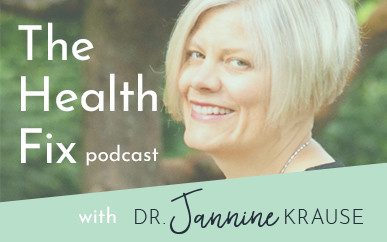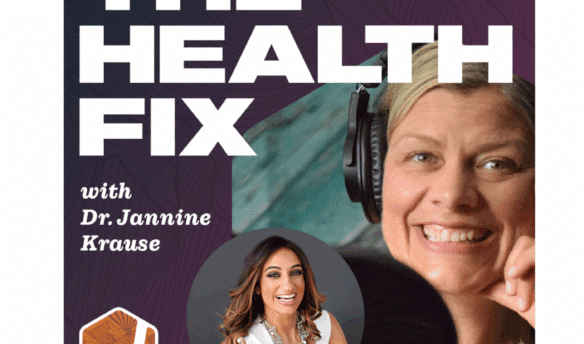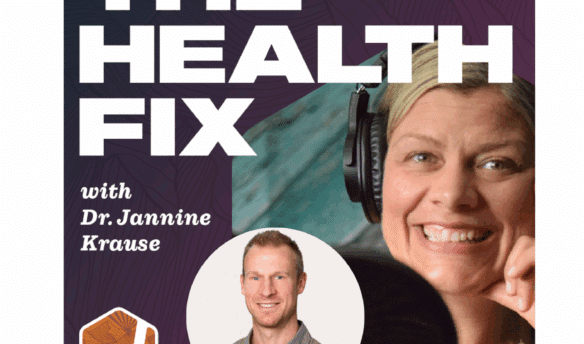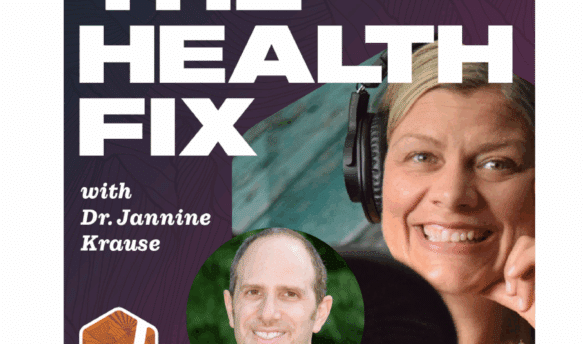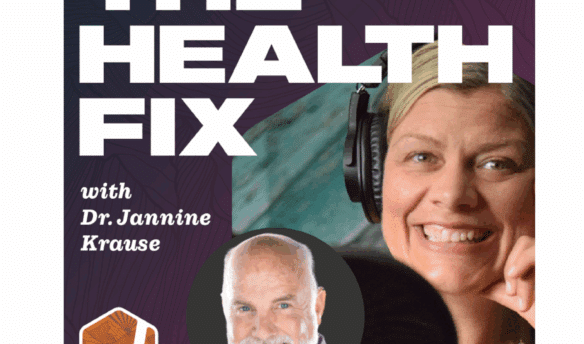Do you struggle with brain fog, memory loss or difficulty concentrating? Perhaps you’re wondering if your brain fog is due to stress, age, hormones, dementia or something worse? You’ve got to get this figured out, but where do you start? Dr. Jannine Krause discusses the 5 main causes for brain fog, how to assess yourself for these causes and current treatment options.
What You’ll Learn In Today’s Episode:
• How to determine what is causing your brain fog
• What to test to evaluate the causes of concentration issues
• Why keeping a daily journal is key to accurately assessing your brain function
• How to choose the best treatment option for your brain fog
Resources from the Show:
• Doc J Krause’s Blog Post on this topic
Highlights from Doc J Krause’s Podcast
5 Common Problems that Interfere with Your Brain Function
• Stress
• Hormone Imbalances
• Nutrient Deficiencies
• Infections
• Illness
How is Cortisol Affecting Your Brain?
Note when your brain issues occur.
Here are the tests to assess cortisol’s impact on your brain:
• Saliva Cortisol – 4 Points – ZRT Labs
• Fasting Hemoglobin A1c – serum – ask your doctor for this or MyMedLab
• Fasting blood sugar – serum – ask your doctor or labs online
• Insulin Resistance Score – serum – ask your doctor or labs online
How Do You Test Your Hormones?
By looking at these hormones you can determine if a hormone imbalance is to blame for your focus issues.
Hormones can be tested using saliva, urine or serum (blood).
• Estrogens: Estrone, Estradiol, Estriol
• Progesterone
• Testosterone
• Sex Hormone Binding Globulin
• DHEA-S
Is Your Diet Causing Your Brain Fog?
The health of your gut and microbiome is crucial for absorbing brain boosting vitamins, minerals, antioxidants, acids and fatty acids.
Your nutrient status could be assessed via blood and urine:
• Vitamin B12, B6, and folate can all be assessed with serum
• Magnesium, Alpha Lipoic Acid, CoQ10, L-Carnitine are crucial for making energy and can be assessed using Genova’s NutrEval Test
• L-glutamine, phosphatidyl choline and serine – amino acids – OAT testing/NutrEval Testing
• Omega three fatty acids – NutrEval Testing
Could Your Gut Health Be Messing With Your Concentration?
If you suspect that you have gut dysbiosis, here’s a list of tests:
• Overgrowth of bacteria & yeast in the intestines – OAT Testing Great Plains Labs, NutrEval by Genova
• Overgrowth of mold – MycoTox – Great Plains Labs
• Overgrowth yeast, bacteria & parasites in the colon – Doctor’s Data CDSA
Do You Have Stealth Pathogens Affecting Your Brain Function?
Here are tests to rule out possible stealth infections:
• Chronic Mononucleosis Infections – serum
• Strep Throat Infection – throat swab
• Parasites – Doctor’s Data CDSA O & P x3
• Hepatitis – serum
• Herpes Viruses – serum
• Lyme Disease – Igenex specialty testing
• Hashimoto’s Thyroiditis – anti-TPOs, thyroglobulin antibodies, TSH (thyroid stimulating hormone), free T3 and free T4
• Autoimmune Antibodies – ANAs (anti-nuclear antibody testing)
The Best Herbs to Improve Focus, Concentration and Memory
Herbs, nutrients, amino acids, vitamins and the gut-brain axis are all areas to address to improve brain function.
Here’s a list of herbs that are effective for improving brain function:
• Cordyceps Mushrooms – decreases brain inflammation, increases 5-HTP (boosts serotonin), increases brain derived neurotrophic factor (BDNF) – Om Mushrooms
• Lion’s Mane Mushrooms – repairs nerves – Om Mushrooms
• Ginko – increases circulation to the brain
• St John’s Wort – increases serotonin, dopamine and noradrenaline release
• Macuna – magic velvet bean – boosts dopamine
• Bacopa – water hyssop – 300-600 mg – improves dopamine and serotonin communication and speeds up neuron communication
• Rhodiola – 400 mg a day – adaptogenic herb that helps you manage stress – Mountain Rose Herbals – Tincture Form (combined with L-theanine)
• Panax Ginseng – 200-400 mg – adaptogenic herb that increases energy
Vitamins, Minerals and Amino Acids are Key For Brain Function
Your food source and the health of your digestive system are two main factors in your nutrient store status.
Here’s a list of vitamins, minerals and amino acids that affect your brain function:
• Vitamin B12, B6 and Folate – all involved in methylation, detox and mood
• Acetyl L-Carnitine, Alpha Lipoic Acid, Co-Enzyme Q 10, Magnesium – increase the process of cellular energy production
• PQQ – pyrroloquinoline Quinone – antioxidant that increases cellular energy production
• Phosphatidyl Serine and Choline – amino acids that increase brain function
• GABA – neurotransmitter that regulates erratic cortisol release
• L-Theanine – amino acid to balance neurotransmitter communication & release
• L-Glutamine – amino acid used to repair cellular and nervous tissue
• L-Tyrosine – amino acid precursor to the formation of dopamine
Are Nootropics Helpful for Restoring Brain Function?
Nootropics increase brain derived neurotrophic factor a protein that maintains and can enhance brain function.
Here’s a list of the most common nootropics available:
• Noopept
• Piracetam
• Pnenotropil
• Modafinil (Provigil)
• Adderall
• Ritalin
Enjoy The Show? Never Miss An Episode
• Subscribe, Rate and Review the show in iTunes
• Subscribe via Stitcher or RSS feed
• Send us feedback via Email
• Leave a comment below
Want to learn more about how to optimize your health? Click Below Now!
